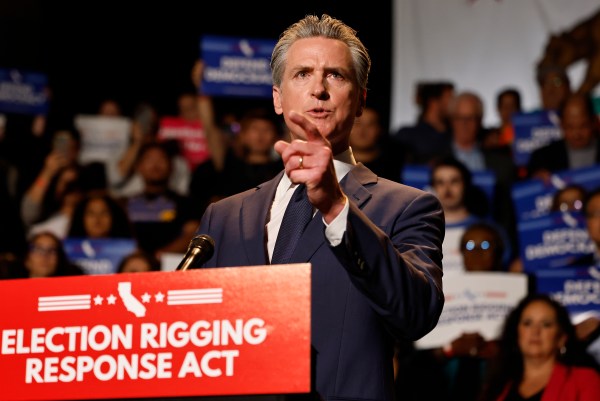The morning after Speaker Mike Johnson won the gavel and took the reins of the House of Representatives in October 2023, the Louisiana Republican found himself in a new office in the Capitol, attempting furiously to get up to speed.
House legislative business had halted for three weeks after Kevin McCarthy was unceremoniously stripped of the gavel as Republicans, who controlled the chamber with a slim majority, struggled to agree on a successor. Johnson, well-liked by all factions but a backbencher with no leadership or significant fundraising experience, was the compromise choice. Barely 24 hours on the job in his sparsely appointed office, he reviewed documents and fielded a long line of visitors—mostly House Republicans asking for favors—when one of them, Rep. Byron Donalds of Florida, came bearing advice.
“One of the people that came in was Byron Donalds who is a good, close friend and ally and he came in and said: ‘You need to go to Las Vegas.’ And I laughed, and thought it was a joke, and he said: ‘No, RJC is meeting right now, it would be such a big, impactful thing,’” Johnson recalled in a telephone interview with The Dispatch earlier this year. Despite an avalanche of new responsibilities and suddenly impossible scheduling demands, the speaker quickly concluded Donalds was right.
“I don’t have time to do that, but I’ve got to make the time,” Johnson remembers thinking. The October 7 attacks in Israel just a few weeks earlier also weighed on Johnson’s decision. The idea of headlining the RJC conference to show solidarity with Israel and American Jews pulled at the speaker’s heartstrings. “That was probably the best suggestion I got in the first week of being speaker,” Johnson said.
A few days later, the speaker was in Las Vegas attending his first-ever Republican Jewish Coalition gathering, the group’s annual leadership conference, frequented by some of the party’s most prolific campaign donors and connected political activists. His appearance was punctuated by an efficient 15-minute address to the roughly 1,000 RJC members and guests who packed a convention center ballroom adjacent to the Venetian Resort.
For the 40-year-old group, Johnson’s presence that weekend was validation. His decision to rush out to the conference—it was Johnson’s first public event as speaker—offered recognition of the RJC as both a fundraising juggernaut and effective grassroots organizer. More broadly, RJC leaders insist it suggests the group occupies rarefied air within the GOP hierarchy that few other party-aligned organizations can claim.
It’s not too shabby for an organization that declined to identify with the Republican Party when it launched as the National Jewish Coalition in April 1985, a few months into President Ronald Reagan’s second term—for fear of discouraging American Jews from affiliating with the fledgling consortium. Nor is it too bad for a political activist group that has always represented a minority constituency within the GOP coalition.
“A powerful organization in politics delivers one of two things: You either deliver money or you deliver votes—and super powerful organizations deliver both,” Matt Brooks, 59, the RJC’s long-tenured chief executive officer, told The Dispatch during a series of conversations about the organization.
“We figured out the secret sauce,” Brooks said.
If there was a driving force behind the formation of the group that would eventually become the Republican Jewish Coalition, George Klein, the last living co-founder, believes it was Max Fisher, a wealthy Detroit businessman who died in 2005 at age 96. “Max was never stale,” Klein, 87, told The Dispatch. “He was vibrant.”
Fisher made a fortune in energy and real estate and was a prolific Republican donor. But he also held leadership positions in the major nonpartisan organizations of his day that advocated for American Jews and Israel’s security. Klein described Fisher in a lengthy telephone interview as more or less the singular liaison to Republicans and conservative policymakers in Washington on behalf of Jewish interests, all the way up to the White House, beginning at least with President Richard Nixon.
“The Democratic Party and the GOP circa 2025 have almost completely swapped positions on Israel—a radical change that began in the 1990s and accelerated this century.”
As the 1970s unfolded, and into the early 1980s, a few other wealthy Republican Jewish businessmen joined Fisher in his GOP outreach. There was Klein, who made money in real estate and still lives in New York City; Richard Fox of Philadelphia, successful in real estate and marketing, who died in 2020 at age 92; and Gordon Zacks of Columbus, Ohio, who earned millions via stewardship of a family footwear and fashion accessories business before dying in 2014 at age 80.
Together, they founded the National Jewish Coalition. The apolitical name would stick until May 1999.
“When we started, if we would have called ourselves ‘Republican Jewish Coalition,’ I think we would have had 25 members. And simply because there weren’t that many Jews who said they were Republicans,” Klein recalled. There was another reason for the opaque branding, he explained: a desire to be “involved in policymaking,” which necessarily required being able to talk to and influence Democrats, who were still nine years away from losing their four-decade grip on the House of Representatives.
Back then, “it was important that there be bipartisanship,” Klein said.
Back then, the Democratic Party was the pro-Israel party—and reliably so.
Republican administrations were occasionally hostile to Israel, seeing the Jewish state as nettlesome for U.S. national security and relations with the Arab-dominated Middle East. As such, it was often Republican presidents who pressured Jerusalem to make security concessions to the Palestinians as part of a peace process intended to yield an independent Palestinian country. The Democratic Party and the GOP circa 2025 have almost completely swapped positions on Israel—a radical change that began in the 1990s and accelerated this century. But during the RJC’s early years, the four founders were forced to balance earnest loyalty to the Republican Party with a staunch support for Israel more aligned with the Democrats.
They resolved the dilemma by adopting a two-pronged strategy to maximize political access and policy influence: Never mince words when conveying disagreements with Republican presidents and other GOP officials, but do it behind closed doors first. Fisher, Fox, Klein, Zacks, and others who initially joined the organization believed this approach would ensure they always had a seat at the table where top Republicans with whom they agreed on most issues were making decisions.
“We are your friends; we’re not going to double-cross you,” Klein said of the strategy. “We’ll tell you the truth—what we think of what you’re doing, right or wrong.”
He referenced a sharp disagreement with President George H.W. Bush in the early 1990s. Bush, attempting to kickstart peace negotiations between Israel and the Palestinians, believed Jerusalem was deliberately thwarting the process. To pressure Israel to change course, he delayed $10 billion in loan guarantees for the Jewish state. The RJC was furious, and Klein sent the 41st president a bluntly worded letter denouncing the move.
In coordination with the RJC, the Bush White House later made the group’s critical letter public. As the New York Times reported in late March 1992, the administration appeared hopeful that releasing both the letter and Bush’s response would help repair the president’s shaky standing with American Jews unhappy about the delay of the loan guarantees, which wouldn’t be approved until later that year.
Klein believes the president’s willingness to listen to what the group had to say—because the president trusted their disagreement was in good faith and not intended to damage him politically—was crucial. “Is it because we were the Republican Jewish Coalition? I don’t know,” Klein said. “But at least we sat at the table. My father always used to tell me: ‘If you’re not at the table, you have nothing to say.’”
But the episode is significant because it is foundational to how the RJC views itself and, in its telling, has functioned ever since.
“Are we going to be court Jews and keep our mouths shut, or are we going to speak up publicly and aggressively? We chose the latter,” Brooks said. “Had we not done that, we would never have had the credibility and the longevity, I think, and the impact that we have now.”
“It established a culture that said: When a Republican does the wrong thing, vis-a-vis our issue, we are going to call it out—publicly and privately,” Brooks added.
In the 30-plus years since the family feud with Bush, the RJC has taken stands against populist Republicans whose opinions on Israel, and U.S. aid to the Jewish state, range from insufficiently supportive to outright antagonistic. In the 1990s, that meant going after conservative pundit and erstwhile presidential candidate Pat Buchanan. More recently, the RJC supported challenges to Iowa’s Steve King (2020) and Virginia’s Bob Good (2024) in GOP House primaries. Both incumbents lost.
In ongoing grudge matches against sitting Republicans, the RJC periodically pushes back against Sen. Rand Paul and Rep. Thomas Massie. The two Kentuckians are dovish libertarians who have voted against U.S. aid to Israel in the past and are skeptical of American global leadership. Indeed, if Massie decides to run for the Senate in the 2026 midterm elections, for the seat being vacated by Republican Sen. Mitch McConnell, the RJC has plans to invest “whatever it takes” to defeat him.
“I hate spending money in Republican primaries to beat up on other Republicans. But if we have to, we will,” Brooks said.
These days, the RJC is monitoring a new threat from the right. Or, maybe it’s best described as the old Buchanan threat the group presumed it had stamped out.
Hostility toward Israel and in some cases, rank antisemitism, is rising among popular podcasters, online influencers, and other media personalities. Their reach is often vast, touching listeners and viewers unaware of basic facts about Israel or Jews. Of particular concern is Tucker Carlson, the former Fox News host turned podcaster. His politics are hard to pin down, but he has mainstream notoriety from a long career as a cable television news host and regularly platforms on his programs people who share his apparent suspicion of Israel and Jews.
Carlson occupies a unique position on the right. He has cultivated a fervent following among populist Republican voters and independents who typically support GOP candidates and is an informal adviser to President Donald Trump, who has been mentioned as a possible future contender for the Republican presidential nomination. Befitting this exalted status in the party, Carlson addressed the GOP nominating convention in Milwaukee last summer and sat in Trump’s box while taking in the festivities.
“This is an evolution and extension of the kind of worldview that we were troubled by, that started back in the early ‘90s with Pat Buchanan,” Brooks said. “Tucker Carlson is the natural heir to Pat Buchanan.”
“It’s important that we be vigilant and honest and true to our convictions and to the Jewish community and combat this stuff,” he added. “We have a woke right in our party that we need to stand up to, just as we stand up to the woke left.”
Many Reagan-era Republicans might argue that there is another Buchanan heir who shares Carlson’s close proximity to Trump: Vice President J.D. Vance, 40.
The rising political star generally questions U.S. global leadership and would prefer Washington turn its back on Ukraine—the sort of Republican politician the RJC tends to oppose, because the spillover effects can be opposition to the U.S. providing material support for Israel. But Brooks claims no anxiety about Vance, saying there’s a difference between the pure isolationists and the Republicans who want to limit American engagement overseas to core national interests.
Matt Brooks“I hate spending money in Republican primaries to beat up on other Republicans. But if we have to, we will.”
The latter faction describes Vance, Brooks argued. In any event, the vice president has “always had a carveout for Israel,” he said. Vance articulated this view in May of 2024 during a speech detailing his foreign policy philosophy. “I’m supportive of Israel and their war against Hamas,” then-Ohio Sen. J.D. Vance said during an address at the Quincy Institute, a Washington, D.C., think tank that advocates for restrained U.S. foreign relations. “But I do not think it is in America’s interest to continue to fund an effectively never-ending war in Ukraine.”
The vice president’s rationalization doesn’t sit well with many traditional conservatives, who worry that noninterventionist conservatives who make an exception for Israel are doing so for political convenience and will eventually find reason to eliminate that exception. Writing in Commentary, the conservative political journal, soon after Trump picked Vance to serve as his running mate, senior editor Seth Mandel said the future vice president’s foreign policy was marred by a “blind spot.” Brooks is unconvinced.
On Trump, 79, whom Brooks calls “the most pro-Israel president, ever, in history,” the RJC brooks no criticism or complaints. And that position largely makes sense. The 45th and 47th president has backed Israel almost unequivocally.
In his first term, he moved the U.S. Embassy from Tel Aviv to Jerusalem, recognized Israeli sovereignty over the Golan Heights, declined to pressure Israel to negotiate a two-state solution with the Palestinians, and brokered the Abraham Accords between the Jewish state and Arab neighbors. So far in his second term, Trump is not attempting to block Israel from waging war against Hamas in Gaza as part of its effort to eradicate the terrorist group. And as before, Trump makes no mention of Palestinian statehood.
Meanwhile, Trump ultimately backed Israel’s military campaign against Iran aimed at eliminating Tehran’s nuclear weapons program. The president even joined the fight with limited air strikes, hitting key Iranian nuclear weapons sites with powerful explosive ordinances that only U.S. Air Force bombers could deliver. These positions and actions represent reversals from Trump’s Democratic predecessor, Joe Biden.
The former president, initially a strong supporter of Israel’s war in Gaza, ended up pressuring Israel to curtail its effort to decapitate Hamas and Iran’s other terrorist proxies in the region. Biden also periodically urged Israel to avoid “escalation” with Tehran despite the Islamic Republic indiscriminately attacking the Jewish state with cruise missiles. Additionally, the Trump administration has been more aggressive in pressuring universities to crack down on campus protests against Israel post-October 7 that claim to be about Palestinian rights but often platform antisemites and target Jewish students.
Still, Trump’s rhetoric about Jewish voters is worrisome to some Jews—especially claims made as a candidate last year that Jews would deserve blame if he lost to then-Vice President Kamala Harris, insisting Jewish voters owe him loyalty for backing Israel. Both comments play into longstanding antisemitic tropes—that Jews are responsible for negative political outcomes and have dual allegiance to Israel and the U.S.
Trump during the 2024 campaign did not single out any other religious bloc for similar scolding—just Jews.
When The Dispatch pressed Brooks roughly two months before the 2024 election to explain why that sort of talk from a politician was acceptable and not potentially harmful to American Jews, he sidestepped the question. Instead, Brooks expressed solidarity with the president while rubberstamping his rhetoric. “[Jewish Democratic voters] are voting against their own self-interests,” he said, during a news conference at last year’s RJC conference. “It boggles people’s minds how and why that occurs.”
Does the Anti-Defamation League, a nonpartisan group that monitors incidents of antisemitism and antisemitic rhetoric, think the RJC is sanitizing how Trump talks about American Jews? It’s unclear; the group declined to comment for this story. Queries to J Street, an organization of progressive Jews, went unanswered.
Perhaps the clearest sign of the influence the RJC now wields within Republican politics is its annual leadership summit, typically a Thursday-through-Sunday event in late October (except in election years.) Indeed, this is the event that Speaker Johnson rushed off to soon after winning the gavel in the fall of 2023.
“It’s an extraordinarily influential group, and the best evidence of that is who comes to our meetings, in particular the annual event in Vegas,” said Eric Levine, a New York City attorney and RJC board member who raises money for Republican candidates and incumbents. “Just look at who shows up at our meetings: Every presidential cycle, every presidential candidate except for Rand Paul shows up.” (Paul ran for president in 2016.)
After years of alternating between Las Vegas and Palm Beach, Florida, since 2010, the late summer-early fall conference has been held along the Las Vegas Strip in a convention center adjoining the upscale Venetian and its luxury Palazzo sister property. The venue was a hat-tip to the now late casino magnate Sheldon Adelson, a Republican megadonor who developed and owned the gambling resorts and was for years—along with wife Miriam Adelson—a consequential RJC figure particularly generous with his checkbook. Miriam Adelson, 79, continues to be an active Republican donor and still attends the Las Vegas conference, where she is something of a celebrity among ambitious GOP politicians.
In 2010, the event attracted 250 people. But attendance has exploded since, regularly topping out at roughly 1,500 people who travel from all over the country to attend. That spike has dovetailed with a similar growth in the number of prominent Republicans clamoring for speaking slots.
The demand from Republicans running for office, or mulling a campaign—for president, Congress, governor, dog catcher (okay, maybe not dog catcher)—has been so high that Brooks has had to stagger invitations to the annual conference. Ditto the interest Brooks gets from incumbent Republican leaders and rank-and-file members of Congress, plus a range of local, state, and national GOP officials (including sitting presidents).
It’s hard to find another event on the Republican political calendar other than nominating conventions and perhaps the Conservative Political Action Conference where party financiers, grassroots activists, campaign strategists, well-known conservative media figures, and elected officials can be seen mingling together. And that’s regardless of where they fall on what has become a rather fluid GOP political spectrum (except those who oppose U.S. financial and military aid to Israel or are otherwise antagonistic toward Jerusalem).
“I don’t know of a group, other than [the American Opportunity Alliance] that drives more attendance from—literally—the A-team of politicians,” said one GOP insider who requested anonymity to speak candidly. That exclusive GOP-aligned organization comprises strictly high-net-worth business titans who can donate seven figures or more.
In key aspects, today’s RJC is a reflection of Adelson and Brooks.
Adelson, referred to by RJC members simply as “Sheldon,” earned the sort of wealth that afforded him not just a private plane but a fleet of planes. For years, a political donor who supported Democrats because they were the more dependable supporters of Israel, Adelson and his campaign contributions migrated to Republicans as the two parties began to switch sides on this issue.
He joined the RJC board of directors in 1997, a move that helped attract other big-money machers, turning the group’s letterhead into a who’s who of well-heeled Jewish Republicans and the organization into something of a unique fundraising and bundling emporium for Republicans. A spokesman for Miriam Adelson did not respond to a request for comment.
Brooks, on the other hand, is credited with transforming the RJC from a boutique advocacy group known primarily for fundraising into a sophisticated organization uniquely adept at identifying Jewish voters, figuring out what messages make them tick, and turning them out to vote for Republicans in crucial battlegrounds where their votes can make a difference.
In early 1988, Brooks was the 22-year-old Massachusetts campaign manager for Jack Kemp’s underdog bid for the Republican presidential nomination. After Kemp’s campaign sputtered, Brooks received a call from the RJC and was offered the political director role. The Philadelphia native’s first day on the job was March 8, 1988. He never left.
Thirty-seven years in, Brooks, named CEO in 2023, is the consummate Washington insider, described as a connected, savvy operator by those who have worked with and around him. It was on Brooks’ recommendation that Trump nominated Mike Huckabee, the former Baptist minister and Arkansas governor, to serve as U.S. ambassador to Israel. Brooks also served as Huckabee’s sherpa during Senate confirmation hearings.
Although even conservative Jews sometimes view American evangelicals who enthusiastically support Israel warily, Brooks is convinced it’s all upside—for Jews in the U.S. and the Jewish state. So the RJC long ago made engagement with American evangelicals a strategic priority. “That was another decision we made early on, too,” Brooks said. Huckabee is the first evangelical Christian to serve as ambassador to Israel.
It’s an example of how Brooks has looked for ways to make the RJC more relevant and effective.
Sen. Dave McCormick, the Pennsylvania Republican who unseated three-term Democrat Bob Casey in November, said the RJC and Brooks—whom he characterized as a “good friend”—were instrumental to his victory.
“RJC was hugely important. I went to the Las Vegas event, I met many donors, they were very supportive on the donor side, in terms of making sure I got exposed. And then they played a super active role in Pennsylvania that only RJC could do,” McCormick told The Dispatch. “Then they did, actually, some specific advertising in Pennsylvania in the final weeks of the campaign that helped President Trump and me. So, it was a big deal.”
McCormick said he marveled at the breadth of Brooks’ relationships, which aside from politics include a close friendship with Philadelphia Eagles general manager Howie Roseman. (Brooks is such a Philly sports fanatic that in January, during the RJC’s inaugural gala, he grabbed a microphone and sang “Fly Eagles Fly” to celebrate the eventual Super Bowl LIX champion’s playoff victory that evening.)
But Brooks’ most important relationship, professionally, was the one he established with Adelson in 1997 when he flew to Las Vegas to land the budding Republican megadonor as an RJC board member. Without Adelson’s generosity and the additional big-time Republican financiers his affiliation with the organization helped engage, Brooks might have never had the resources to grow the RJC into the political juggernaut that exists today.
The board member who had the pre-existing relationship with Adelson was Mel Sembler, a shopping center mogul from Florida who died in 2023 at age 93. So, Sembler (along with a few other RJC board members) joined Brooks in Sin City for the Adelson pitch meeting. It took place in a trailer at the construction site for the Venetian.
RJC pitch meetings tended to be scripted, and Brooks, Sembler, and the other board members had rehearsed their lines.
But as Brooks recalls, at one point the meeting went off-script when Adelson had an idea and asked Brooks for his opinion. “It just kills me because I can’t remember to this day what he had to say. But Sheldon had said something and then he looked at me and says: ‘What do you think, Matt?’ I said something to the effect that: ‘I think that’s the dumbest idea I’ve ever heard in my life.’” Brooks added that “you could have just seen the color drain from everybody’s” face.
But Adelson seemed to appreciate the candor, and the RJC closed the sale—no additional pitch meetings required. The group’s new whale had only one request in regard to his participation: “I don’t want to be the only schmuck with a checkbook,” Adelson said, according to Brooks.
Since Election Day 2024, the Republican Jewish Coalition has been telling anyone who will listen that Trump’s performance among Jewish voters was a historic success—due in no small part to the money and manpower invested by the RJC. There’s data to back that assertion up.
Per Fox News exit polls, Trump received 33 percent of the Jewish vote nationwide. The nonpartisan Pew Research Center pegged Trump’s support among Jewish voters even higher, at 35 percent. That’s better than the 30 percent he garnered in 2020 and an improvement over the 24 percent he earned in 2016. It was also the best showing for a Republican nominee since George H.W. Bush’s 35 percent in 1988 and Ronald Reagan’s 39 percent in 1980. (Some of the exit polling out there found Trump’s share of the Jewish vote to be significantly lower.)
But Trump’s support among Jewish voters nationwide last November, whether as good as the Fox News numbers suggest or not, is not really of concern to the RJC. To understand the real and consequential movement toward Trump by Jewish voters in 2024, you have to look under the hood, at the exit polls of battleground states and local precincts with significant populations of Jewish voters. That’s where Trump made his mark with a cohort usually elusive for Republicans; it’s what helped propel him past Harris in swing states that were quite close despite the president’s sweep.
Trump garnered 41 percent of the Jewish vote in Pennsylvania, the motherlode of all 2024 battlegrounds. That’s substantially higher than his national numbers among Jewish voters. In Michigan, another swing state, there was a substantial shift to Trump in communities with the most Jewish voters compared to four years previous. All situated in the Detroit suburbs, Oak Park moved net 7 points to the president, Bloomfield Township moved 5 points, West Bloomfield Township moved 9 points, Southfield moved 5 points, and Southfield Township moved 1 point.
Harris no doubt gave Trump and some downballot Republicans a nudge.
The former vice president’s husband, Doug Emhoff, is Jewish, and she repeatedly highlighted her history of supporting Israel as a senator from California—so much so that Arab Americans in the key Michigan community of Dearborn delivered a plurality of their vote to Trump. But while Biden often proudly referred to himself as a Zionist, Harris was the official in his administration who most often questioned Israel’s conduct of the war in Gaza and expressed sympathy for the plight of the Palestinians. Many Jewish voters simply did not trust her promises to continue the U.S.’s historic support for Israel and prioritize combatting the rise of domestic antisemitism.
This concern, as captured in this RJC television advertisement, was a major sticking point with many Jewish voters who had previously not even considered voting Republican, especially with Trump at the top of the ticket.
Jewish voters were (and remain) alarmed by rising antisemitism across the country, especially in urban centers and on college campuses rife with pro-Palestinian protests. Participants in these events often donned keffiyehs, threatened Jewish businesses and students, and channeled Hamas messaging that calls for Israel’s eradication. And many Jewish voters simply never felt comfortable with Harris. They believed the Democratic nominee was not a reliable supporter of Israel and feared she would not crack down on domestic antisemitism, despite her husband’s Judaism.
But the RJC believes that much of this—Trump’s elevated performance with Jewish voters, and Jewish voters’ suspicion of Harris—was the fruit of its investment and labor as funneled through a strategy the group developed over many years. In the 2024 election cycle, the group spent more than $20 million to pay for microtargeting, voter turnout efforts, advertising, and to build a proprietary voter file of Jewish voters for Senate candidates. Crucially, resources were deployed only to battlegrounds where presidential and Senate contests were on the line.
“We learned after several cycles and several iterations of refining this,” Brooks said, explaining that, when the RJC initially got into the field business of hustling Jewish votes for Republicans, “we got caught in the trap of trying to [increase] the Jewish vote number, nationally. … So we were throwing a lot of money and a lot of resources at places that didn’t matter in terms of determining who the next president of the United States is.”
Ultimately, the RJC decided to stop chasing the national exit poll numbers and instead, Brooks said, “move the needle in a significant way in the battleground states, which are where there’s a large Jewish population and in a close election could have an outsized role [in] determining the results.” As part of this strategy shift, the RJC, based in Washington, D.C., and within walking distance to the Capitol, has opened regional headquarters in Las Vegas and Philadelphia.
The group also has offices in the Jewish population centers and fundraising hubs of Los Angeles, New York, and Boca Raton, Florida. On the policy advocacy side, the RJC recently hired a second full-time lobbyist, with one focused on Congress and the other on the presidential administration. At the grassroots level, the group claims roughly 85,000 people are either paying members or have signed up digitally to receive RJC materials, although an RJC spokesman declined to specify how many of each.
But it is true that the RJC has grown demonstrably in the last quarter century-plus, since launching its first political action committee in May of 1999. Brooks said at the time he stole the idea for the PAC from the National Jewish Democratic Council, at the time the RJC’s Democratic counterpart.* (The NJDC folded some years later and in 2017, a new group, the Jewish Democratic Council of America launched, and has since then served as RJC counterpart.)
The goal of its first election cycle in 2000 was to donate more than $100,000 to the Republican presidential nominee and GOP congressional candidates. Nearly a quarter century later, the RJC’s political action committee and super PAC spent $20 million to elect Trump and Republicans running for Senate in key states—double the $10 million invested by the group in 2020. And the $20 million in RJC expenditures in 2024 does not include the $100 million donated to GOP candidates and causes by Miram Adelson, nor the additional $25 million contributed by other party financiers affiliated with the RJC, in the same election.
The RJC was able to build from there because group officials, extending from Brooks to the board of directors, prioritized recruiting new members into the organization. They did not want the RJC to wither, losing political influence or punch, as board members grew old and less active, as was inevitable and began happening after the turn of the century. It’s among the reasons wealthy Republican donor Fred Zeidman, 80, has been joined on the RJC board by his son, businessman Jay Zeidman, 41 (both are from Houston.)
“You’re watching the lions pass. Sheldon is gone, and Mel Sembler’s gone, Sam Fox is gone, and people like my father are looking to pass the torch,” Jay Zeidman said. “The RJC has done a great job of recruiting the next generation—people who are willing to stand up, be unapologetic about both their politics and priorities, and to do something, the way our heroes and mentors did.”
Correction, July 23, 2025: This article has been updated to reflect that the National Jewish Democratic Council folded.







Please note that we at The Dispatch hold ourselves, our work, and our commenters to a higher standard than other places on the internet. We welcome comments that foster genuine debate or discussion—including comments critical of us or our work—but responses that include ad hominem attacks on fellow Dispatch members or are intended to stoke fear and anger may be moderated.
With your membership, you only have the ability to comment on The Morning Dispatch articles. Consider upgrading to join the conversation everywhere.